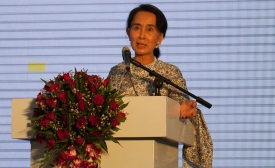aung san suu kyi

Nafay Choudhury looks at the soft power behind the Nobel Peace Prize and its importance in the plight of Rohingya Muslims in Myanmar.
The Rohingya may be at the brink of facing genocide. Despite widespread international outcry, the pro-democracy Nobel Peace Prize Laureate Aung San Suu Kyi has remained deafeningly silent while the military continues its onslaught of the Rohingya. Worse yet, her title of Nobel Laureate serves to legitimize her continued (in)actions, while Rakhine State goes up in flames.
As the armed conflict in Rakhine State continues to escalate, forcing over 120,000 Rohingya Muslims from their homes, another war rages online as social media becomes the battlefield for winning hearts, minds and international support. The impact of social media in the latest clashes is proving a powerful tool with counter-narratives being thrown from each side.
On 7 October, President Obama signed an executive order lifting nearly all of the remaining economic sanctions on Myanmar’s government [...] Despite China’s enduring influence over its neighbour, the United States enjoys several unrecognised advantages over the Asian giant, flowing from its substantial soft power, an asset China has failed to cultivate.
Chinese President Xi Jinping promised to support Myanmar’s peace process Friday as he met with the country’s de facto leader, Aung San Suu Kyi, in Beijing ahead of historic talks with armed groups near the countries’ troubled border.
According to Parni, civic diplomacy involves “people to people” contact through all means, involving social media and conventional media ( press diplomacy ) with particular emphases on social ( humanitarian ) and concrete cultural activities.
What do the U.S., Argentina, Afghanistan, and Myanmar have in common? This summer, two opportunities enabled me to explore this question from my perspective as an American violinist who recently moved to Argentina from Afghanistan.

An American violinist and cultural diplomat explores the unifying power of music.







